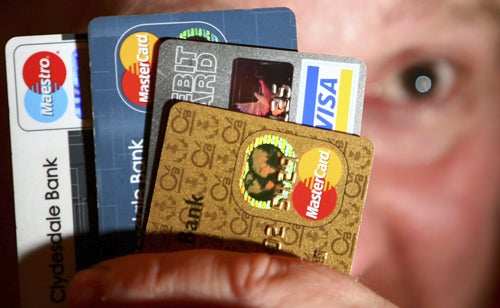27.9%: is this the shape of cards to come?
As the Halifax offers expensive plastic for people with no credit history, Julian Knight asks if more of us will end up paying a high rate

A clear sign has emerged that card borrowers and particularly those who do not have a top-notch credit record face having to pay higher rates of interest.
Last week, the Halifax launched its Classic Visa product charging a whopping 27.9 per cent.
The bank says that the card is specifically designed for people with a low credit score, maybe because they are young, on low incomes, in rented accommodation or recently divorced. The interest rate is much higher than the 8.9 per cent levied on the bank's cheapest credit card.
But beyond the Halifax, the launch of Classic Visa has sparked fears that increasing numbers of consumers could be shunted on to credit cards and loan products which charge higher rates.
"There is a tightening of credit scoring going on in reaction to the credit crunch," says Richard Mason from price-comparison site Moneysupermarket.com. "The number of people considered prime [a good risk] by lenders may be falling."
"As a result, people who would once have been accepted on to a standard credit card could be offered a higher-rate card instead," adds Mr Mason.
Samantha Owens, spokes- woman for comparison site Moneyfacts.co.uk, says that in the light of the credit crunch, many Britons can expect to have to pay more for their borrowing. It's even possible they may not be able to find a lender at all.
"Borderline cases, where applicants may have a low credit score, have been accepted in the past but may now be rejected," she explains. "This will push more people into more expensive methods of borrowing, such as this [Halifax Classic Visa] card."
The Halifax, though, says its Classic Visa is not going to end up as a dumping ground for large numbers of people who may not have an A1 credit rating. Instead, it stresses that the card is for a "niche" market only: people with little or no credit history.
"What we are doing is providing the opportunity of a credit card to people who for whatever reason divorce or not being on the electoral roll may not have been able to build up a credit score," explains Alex Barnett, a spokesman for the Halifax.
He adds that Classic is not designed for people with poor credit histories, so-called sub-prime, who have previously defaulted on an agreement.
"No one with a county court judgment (CCJ) against them for loan defaults will be able to get this card," says Mr Barnett.
Credit limits will also be strictly controlled, ranging between £500 and £2,000 as part of what the bank describes as its "responsible lending strategy".
The Halifax is not the only provider of cards for people with low credit scores. Major players Barclaycard and Capital One both have higher-rate plastic for "non-standard" customers.
The Barclaycard Initial card (launched in 2003) charges 27.9 per cent and the Capital One Classic (launched in 1999) levies 34.9 per cent. Capital One says that its Classic Visa is probably open to more consumers than the Halifax's card as it doesn't automatically exclude applicants who have a CCJ.
However, with rates on these products approaching those more normally associated with store cards, Ms Owens warns: "It is clearly a very pricey form of borrowing. People should not have outstanding balances on these cards for any length of time."
The Halifax has unveiled its Classic Visa at a time when many banks are finding it increasingly expensive to finance personal loans, mortgages and credit cards.
The turmoil on the international money markets following the collapse of the American sub-prime mortgage sector has increased the costs to banks of borrowing from each other.
Only last week, a survey by comparison site Money- Expert.com revealed that the costs of unsecured personal loans are climbing markedly. MoneyExpert found that the average interest rate on an unsecured loan of £5,000 is now nearly 9.5 per cent.
Meanwhile, companies such as LV, GE Money and Leeds Building Society have pulled out of the unsecured loans market entirely.
Barclaycard has also cut card spending limits for thousands of customers.
Consumer risk: how interest charges vary
Cards for low credit scores/Spending limit/Cheapest card from same firm
Barclaycard Initial Visa: 27.9%/250 - 2,000/Barclaycard Platinum Visa: 14.9%
Halifax Classic Visa: 27.9%/500 - 2,000/Halifax flat-rate card: 8.9%
Capital One Classic Visa: 34.9%/Up to 2,500/Capital One Platinum Visa: 9.9%
Subscribe to Independent Premium to bookmark this article
Want to bookmark your favourite articles and stories to read or reference later? Start your Independent Premium subscription today.

Join our commenting forum
Join thought-provoking conversations, follow other Independent readers and see their replies